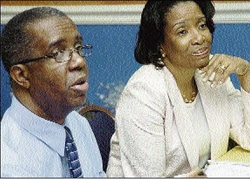'Understand the seriousness of not buckling up'
Published: Monday | December 21, 2009

Dr Lucien Jones, vice-chairman of the National Road Safety Council (NRSC), and Paula Fletcher, NRSC executive director.
Dr Lucien Jones, vice-chairman and convenor of the National Road Safety Council (NRSC), says passengers need to understand fully the protection given to persons who buckle up in the back seat of vehicles and the danger of non-use.
Jones' declaration came as the NRSC noted with concern the deaths of three persons in a motor-vehicle crash on Highway 2000 last Thursday, apparently as a result of not using seat belts in the back seat of the vehicle and a tyre blowout.
Two persons died on the spot and a third reportedly died in the hospital.
"Unrestrained back-seat passengers become bullets in a crash, putting not only themselves but everyone in the vehicle at risk," Jones said.
"That's because unbelted back-seat passengers continue to move at the same rate of speed as the vehicle they're riding in until they hit something - the seat back, the dashboard, the windshield, the driver, another passenger. It's also not uncommon for unbelted passengers to be thrown from a vehicle and either crushed by that vehicle or another on the road."
He continued: "Some people mistakenly believe it's better to be thrown clear of the wreckage in the event of a crash, but this could not be further from the truth. The fact is an occupant is four times as likely to be fatally injured when thrown from the vehicle. When you are not wearing a safety belt, your chances of being killed are almost 25 times higher if you are thrown from a vehicle in a crash."
Jones stressed that the law requires occupants of motor vehicles to buckle up in the front as well as in the back.
"The law also applies to taxis," he said. "When the law was enacted in 1999, an appeal by taxi drivers to the then minister of Transport and Works resulted in him waiving the use of seat belts in the back of taxis on a temporary basis. However, the law remained the same and is to be applied to persons in the back of taxis."
He also reminds that safety-device use also applies to children who are to be put in a car seat in the back of the vehicle if they are too small to be safely and comfortably restrained by a seat belt. It is not safe to place a car seat in the front of the vehicle as the airbag can be deployed in a crash, putting the child at risk of injury or death.
NRSC Executive Director Paula Fletcher also commented on the tyre blowout: "Tyres are the only parts of the vehicle which are in contact with the road. Safety in acceleration, braking, steering and cornering all depend on a relatively small area of road for contact. It is therefore of paramount importance that tyres should be maintained in good condition at all times and that when the time comes to change them, the correct tyres are fitted.
"Defective tyres are a crash hazard, especially when going at high speeds and on high speed roads such as Highway 2000. The faster the tyre turns, the greater the friction with the road surface and this causes heat to build up and tyres to break away under this pressure, especially if they are defective."
Fletcher encouraged motorists to be aware of their tyres' appearance, such as cracking of the tread/sidewall rubber
Performance
"Also, they should be alert for any change in performance such as increased air loss, noise or vibration. Such changes could be an indicator that one or more of the tyres should be immediately removed and replaced."
She also warned that prolonged underinflation causes excessive deterioration of the casing and rapid wear of the tread shoulders. The vehicle will also consume more fuel. Overinflation results in an uncomfortable ride, a reduced area of contact with the road, accelerated wear on the tread centre and makes the tyre more susceptible to impact damage.
The NRSC recommends that inflation pressure should be checked at least every two weeks and only when the tyre is cold, since there is an increase in pressure when the tyre has warmed up after being run. A reliable and accurate pressure gauge should be used.
"The holiday season is a time of joy," said Jones. "I am appealing to my fellow Jamaicans to take extra care on the road to prevent the heartbreak that comes from loss of life and injury in road crashes."







